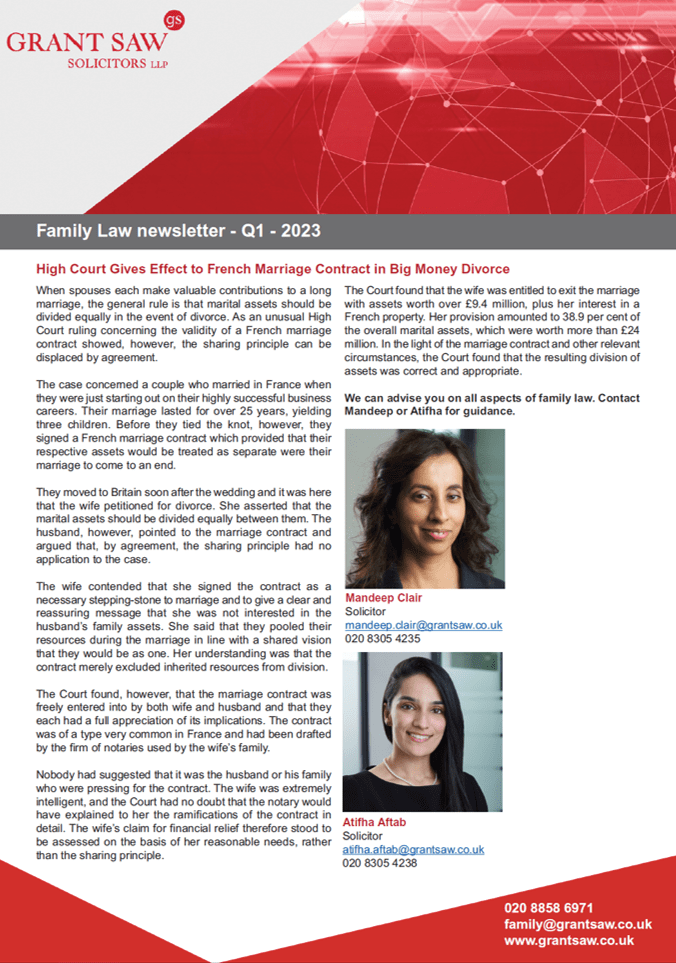A bankrupt individual may be able to apply to annul the bankruptcy order made against them. There are three main grounds by which a court may annul a bankruptcy order.
- The bankruptcy order ought not to have been made.
- The bankruptcy debts and expenses have all been paid or security has been given for them to the satisfaction of the court.
- An undischarged bankrupt individual has entered into an Individual Voluntary Arrangement with their creditors.
We consider each of the above mentioned grounds in more detail below.
The bankruptcy order ought not to have been made
It may be possible for a bankrupt individual to apply to annul the bankruptcy order on the basis that the bankruptcy order ought to not have been made, for one or more of the following (non-exhaustive) reasons.
- Where the bankruptcy petition debt could have been substantively disputed by the bankrupt or set off was available.
- Where the court did not have jurisdiction to make the bankruptcy order. This usually arises where the bankrupt can show that England & Wales was not the bankrupt’s “centre of main interests”.
- Where there is a procedural error. The most common procedural error arises where service of the bankruptcy petition is defective or incomplete.
- Where there is a breach of natural justice. For example where the bankrupt had not attended the hearing of their petition because they had not been given sufficient notice of it or had been misled into thinking it would be adjourned.
It should be noted that the court has wide discretion when deciding whether or not to annul a bankruptcy order under this ground. If the court concludes that the bankruptcy order should have been made, it is very likely that it will dismiss the application.
The bankruptcy debts and expenses have been paid or security has been given to the satisfaction of the court.
It is possible for a bankruptcy order to be annulled, if the bankrupt individual can make payment of the bankruptcy debts and expenses or provide sufficient security to cover all the bankruptcy debts and expenses.
Insolvency law does not permit a bankrupt individual to utilise his/her own funds or assets, for the purpose of applying for an annulment under this ground, as those funds/assets would generally form part of the estate in bankruptcy. Therefore, if the bankrupt individual wishes to apply for annulment under this ground he/she must rely on third party funds (i.e. funds from friends of family) and/or third party funding (i.e. by way of a loan from specialist finance companies) in order to satisfy all the bankruptcy debts and expenses.
Debts in this context means those bankruptcy debts for which a creditor has proved and not withdrawn at the date of the hearing of the application for an annulment.
The main benefits for applying for and obtaining an annulment of a bankruptcy order under this ground are the following:
- It releases the bankrupt individual from any bankruptcy related restrictions;
- The assets of the bankrupt individual would no longer vest in the Official Receiver or the trustee in bankruptcy;
- It prevents the Official Receiver or trustee from realising the bankrupt’s assets any further, which in most bankruptcies, consist of the bankrupt’s family home;
- The Official Receiver and Secretary of State charge fees and expenses in all bankruptcies for performing their statutory functions and duties under the Insolvency Act 1986, in particular charging a significant sum when a bankrupt’s asset is realised. If an annulment application is made promptly, this will save such fees and charges from escalating. Furthermore, if an application for annulment has been made prior to any assets being realised it is likely to prevent the significant Secretary of State Fees altogether, however, do note that the Official Receiver’s General Administration Fee is fixed at £7,200 and must be paid in full;
- If the application is made promptly after the bankruptcy order has been made, it prevents the trustee’s remuneration from escalating. It is sensible to inform the trustee of the intention to apply for an annulment order promptly, so that the trustee does not spend time and money in taking any substantive steps in administering the estate in bankruptcy
An undischarged bankrupt individual has entered into an Individual Voluntary Arrangement (IVA) with their creditors
If a bankrupt individual (usually with the assistance of an insolvency practitioner) has entered into an IVA with his/her creditors, pursuant to section 261 of the Insolvency Act 1986, the court must annul the bankruptcy order.
However, an application under this ground cannot be made until the time period for challenging an IVA has expired. If there is a pending challenge to the IVA, the court is unlikely to annul the bankruptcy order until the determination of the challenge to the IVA.
Outline of procedure for applying for annulment of a bankruptcy order
To obtain an annulment of the bankruptcy order, you must apply to the court. The process is as follows:
- Complete and issue an application form;
- File a witness statement alongside the correct information and evidence; and
- Pay the court fee of £318.
The court will set a date for the hearing. The application and witness statement must be served on the Official Receiver and the trustee, if one has been appointed. It must also be served on the petitioning creditor if the application is on the basis that the bankruptcy order should not have been made. These documents must have been correctly served at least 14 days before the hearing.
Not less the 21 days before the hearing date, the Official Receiver and the trustee must send a report to the court setting out the circumstances leading up to the bankruptcy, details of the bankrupt’s assets and creditors and what arrangements have been made for paying off or giving security for the debts. The report will also usually indicate whether the Official Receiver or trustee will support or oppose the application.
If, at the hearing, the court is satisfied that one of the grounds for annulment has been proved, the bankruptcy will be annulled, by way of a court order.
If the bankruptcy is annulled, the court order should include provision for any bankruptcy entries in the Land Charges Register to be removed. This will therefore enable an application to the Land Registry for the removal of such entries.
For more information on annulling a bankruptcy, please email litigation@grantsaw.co.uk or contact our insolvency experts on 020 8858 6971.
Meet the Bankruptcy annulment team















































